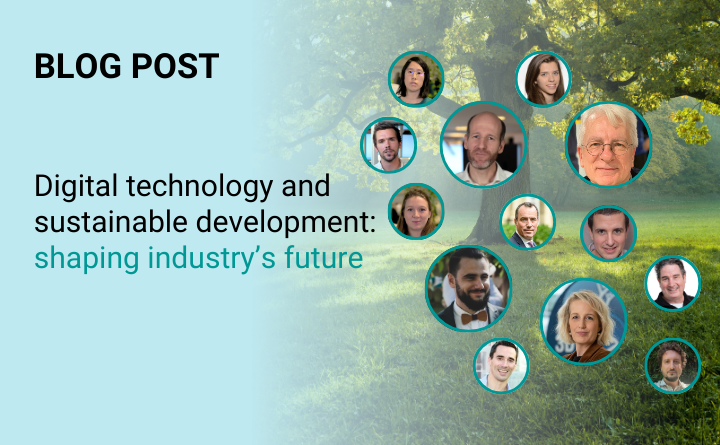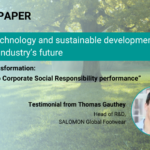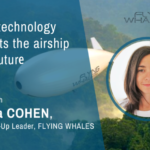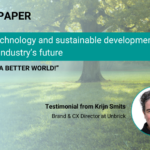Digital technology and sustainable development: shaping industry’s future
What is the reason for writing a white paper on digital technology for a more sustainable industry? Because reducing our carbon footprint is becoming a major challenge for our customers. European directives and Corporate Social Responsibility (CSR) are pushing them to do so. Consumers and citizens are demanding it. According to IPCC experts, achieving carbon neutrality by 2050 is a necessary condition to limit a global warming to +1.5°C. Eco-design, virtual twins and the circular economy are all contributing to optimised production that uses less energy and materials.
Digital continuity, a catalyst for sustainable innovation
CENIT’s mission statement “We empower sustainable digitalization” takes on its full meaning through its consulting, optimization, integration and management of digital processes in industry.
” Digital is a key to staying ahead of the curve in today’s fast-moving marketplace “, says Peter Schneck, CEO of the CENIT Group. Industry has many digital solutions at its disposal, such as those developed by Dassault Systèmes, for implementing new models and processes that combine innovation and sustainable development. Philippine de T’Serclaes, Chief Sustainability Officer, Dassault Systèmes, explains: “At Dassault Systèmes, we build sustainability into the design of our software solutions to help our customers reduce the carbon footprint of their products by optimizing energy efficiency and using renewables.”
Even if science is one of the levers for meeting the challenges of preserving natural resources and achieving sustainable development objectives, we can’t rule out the search for new business models such as the circular economy. Martin Grunau, Senior Vice-President, 3DS Solutions CENIT & COO KEONYS is convinced: “We’re at a turning point where we need to move from the dogma of ‘always more’ to a rallying cry of ‘always better’.”
The financial sector and the CSRD directive
The Corporate Sustainability Reporting Directive (CSRD) is a European regulation that requires many companies to report on their environmental, social and governance (ESG) impacts.
“The new rules, which aim to strengthen climate reporting, mark an important step towards better assessing the extra-financial performance of companies and encouraging them to develop a strategy that is more respectful of sustainable development issues,” points out Axelle Mazé, Sustainability VP, CENIT Group.
Questioning the how rather than the why
This white paper is the fruit of in-depth reflection and feedback involving companies, experts and partners on the contribution of digital technology to the decarbonization of industrial activities. At SALOMON Footwear, digital transformation is a lever for CSR performance. EPSYL, ALCEN group, designs and operates digital twins to promote sobriety. UNBRICK has set itself the challenge of becoming a developer of sustainable homes as part of a continuous improvement strategy. FLYING WHALES is developing an airship that will revolutionize air freight transport in the future.
Thinking differently, surrounding yourself with talented people, finding the best solutions in a collaborative way, change management is an opportunity to work together to imagine responsible and prosperous models, while helping to build a sustainable world.
In our new white paper, you can find out more about the various interviews and expert opinions we have gathered from civil society, business and academic sectors.
Many thanks to Dominique Bourg, Philosopher, researcher and honorary professor, Philippine de T’Serclaes, Chief Sustainability Officer, Dassault Systèmes, Laurent Champaney, President Arts et Métiers, Frédéric Segonds, Faculty member at the LCPI product design, Arts et Métiers, Saskia Eckert, PhD student at the LCPI product design, Arts et Métiers, Thomas Gauthey, Head of R&D, SALOMON Global Footwear, Thibault Ardhuin, Manager of Epsyl’s Toulouse Office, EPSYL- Groupe ALCEN and Nicolas Baillot d’Etivaux, Head of Data Science and Multi-Physics Modeling, EPSYL- Groupe ALCEN, Krijn Smits, Brand & CX Director, UNBRICK, Olivier Specklin, Head of high-level architecture, Alexis Levesque, Production engineer, Stéphanie Loisi, Installation engineer, and Clémence Taillardat, Installation engineer, FLYING WHALES.





